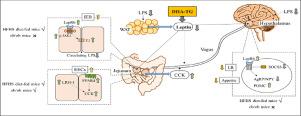当前位置:
X-MOL 学术
›
J. Nutr. Biochem.
›
论文详情
Our official English website, www.x-mol.net, welcomes your
feedback! (Note: you will need to create a separate account there.)
Triacylglycerol rich in docosahexaenoic acid regulated appetite via the mediation of leptin and intestinal epithelial functions in high-fat, high-sugar diet-fed mice
The Journal of Nutritional Biochemistry ( IF 4.8 ) Pub Date : 2021-09-10 , DOI: 10.1016/j.jnutbio.2021.108856 Wanxiu Cao 1 , Fang Liu 2 , Robert W Li 3 , Ruili Yang 2 , Yuming Wang 4 , Changhu Xue 4 , Qingjuan Tang 2
The Journal of Nutritional Biochemistry ( IF 4.8 ) Pub Date : 2021-09-10 , DOI: 10.1016/j.jnutbio.2021.108856 Wanxiu Cao 1 , Fang Liu 2 , Robert W Li 3 , Ruili Yang 2 , Yuming Wang 4 , Changhu Xue 4 , Qingjuan Tang 2
Affiliation

|
High-fat, high-sugar diet (HFHS) induced leptin resistance and intestinal epithelial dysfunction is implicated in hyperphagia and metabolic disorders. Numerous studies have demonstrated the efficacy of dietary interventions for reducing appetite. This study aims to investigate whether triacylglycerol rich in DHA (DHA-TG) could regulate appetite in mice fed with a HFHS diet and the mechanism by which it achieves that. DHA-TG could reduce food intake and regulate neuropeptides (POMC, AgRP, and NPY) expression in HFHS diet-fed mice. Hypothalamic transcriptome analysis reveals that these effects might be attributed to the role of DHA-TG in modulating hormone secretion and digestive system process. According to ELISA and RT-qPCR analysis, DHA-TG ameliorated leptin secretion and attenuated central leptin resistance induced by HFHS diet feeding. Besides, DHA-TG prevented the damage of intestinal epithelial barrier in nutritive obese mice by improving leptin sensitivity. Based on jejunal transcriptome analysis, DHA-TG also protected intestinal endocrine function, especially the secretion of another anorectic hormone, cholecystokinin (CCK), in HFHS diet-fed mice. Furthermore, DHA-TG was ineffective in repressing appetite, and improving gut leakage in leptin-deficient mice (ob/ob mice). In conclusion, DHA-TG has a potential to regulate appetite with the action of leptin, and intestinal epithelial functions in HFHS diet-fed mice.
中文翻译:

富含二十二碳六烯酸的三酰甘油通过介导瘦素和肠上皮功能调节高脂肪、高糖饮食喂养小鼠的食欲
高脂肪、高糖饮食(HFHS)诱导的瘦素抵抗和肠上皮功能障碍与食欲亢进和代谢紊乱有关。大量研究已经证明饮食干预对于降低食欲的功效。本研究旨在调查富含 DHA 的三酰甘油 (DHA-TG) 是否可以调节 HFHS 饮食喂养的小鼠的食欲以及实现这一目标的机制。 DHA-TG 可以减少 HFHS 饮食喂养小鼠的食物摄入量并调节神经肽(POMC、AgRP 和 NPY)表达。下丘脑转录组分析表明,这些作用可能归因于 DHA-TG 在调节激素分泌和消化系统过程中的作用。根据 ELISA 和 RT-qPCR 分析,DHA-TG 改善瘦素分泌并减弱 HFHS 饮食喂养引起的中枢瘦素抵抗。此外,DHA-TG通过提高瘦素敏感性来防止营养性肥胖小鼠肠上皮屏障的损伤。根据空肠转录组分析,在 HFHS 饮食喂养的小鼠中,DHA-TG 还可以保护肠道内分泌功能,特别是另一种食欲激素胆囊收缩素 (CCK) 的分泌。此外,DHA-TG 在抑制瘦素缺陷小鼠(ob/ob 小鼠)的食欲和改善肠漏方面无效。总之,DHA-TG 具有通过瘦素的作用调节 HFHS 饮食小鼠的食欲和肠上皮功能的潜力。
更新日期:2021-09-10
中文翻译:

富含二十二碳六烯酸的三酰甘油通过介导瘦素和肠上皮功能调节高脂肪、高糖饮食喂养小鼠的食欲
高脂肪、高糖饮食(HFHS)诱导的瘦素抵抗和肠上皮功能障碍与食欲亢进和代谢紊乱有关。大量研究已经证明饮食干预对于降低食欲的功效。本研究旨在调查富含 DHA 的三酰甘油 (DHA-TG) 是否可以调节 HFHS 饮食喂养的小鼠的食欲以及实现这一目标的机制。 DHA-TG 可以减少 HFHS 饮食喂养小鼠的食物摄入量并调节神经肽(POMC、AgRP 和 NPY)表达。下丘脑转录组分析表明,这些作用可能归因于 DHA-TG 在调节激素分泌和消化系统过程中的作用。根据 ELISA 和 RT-qPCR 分析,DHA-TG 改善瘦素分泌并减弱 HFHS 饮食喂养引起的中枢瘦素抵抗。此外,DHA-TG通过提高瘦素敏感性来防止营养性肥胖小鼠肠上皮屏障的损伤。根据空肠转录组分析,在 HFHS 饮食喂养的小鼠中,DHA-TG 还可以保护肠道内分泌功能,特别是另一种食欲激素胆囊收缩素 (CCK) 的分泌。此外,DHA-TG 在抑制瘦素缺陷小鼠(ob/ob 小鼠)的食欲和改善肠漏方面无效。总之,DHA-TG 具有通过瘦素的作用调节 HFHS 饮食小鼠的食欲和肠上皮功能的潜力。











































 京公网安备 11010802027423号
京公网安备 11010802027423号